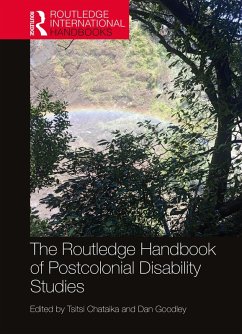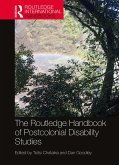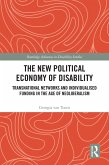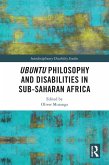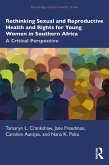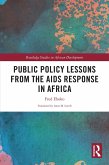The Routledge Handbook of Postcolonial Disability Studies (eBook, ePUB)
Redaktion: Chataika, Tsitsi; Goodley, Dan
45,95 €
45,95 €
inkl. MwSt.
Sofort per Download lieferbar

23 °P sammeln
45,95 €
Als Download kaufen

45,95 €
inkl. MwSt.
Sofort per Download lieferbar

23 °P sammeln
Jetzt verschenken
Alle Infos zum eBook verschenken
45,95 €
inkl. MwSt.
Sofort per Download lieferbar
Alle Infos zum eBook verschenken

23 °P sammeln
The Routledge Handbook of Postcolonial Disability Studies (eBook, ePUB)
Redaktion: Chataika, Tsitsi; Goodley, Dan
- Format: ePub
- Merkliste
- Auf die Merkliste
- Bewerten Bewerten
- Teilen
- Produkt teilen
- Produkterinnerung
- Produkterinnerung

Bitte loggen Sie sich zunächst in Ihr Kundenkonto ein oder registrieren Sie sich bei
bücher.de, um das eBook-Abo tolino select nutzen zu können.
Hier können Sie sich einloggen
Hier können Sie sich einloggen
Sie sind bereits eingeloggt. Klicken Sie auf 2. tolino select Abo, um fortzufahren.

Bitte loggen Sie sich zunächst in Ihr Kundenkonto ein oder registrieren Sie sich bei bücher.de, um das eBook-Abo tolino select nutzen zu können.
This book centres and explores postcolonial theory, which looks at issues of power, economics, politics, religion, and culture and how these elements work in relation to colonial supremacy.
- Geräte: eReader
- ohne Kopierschutz
- eBook Hilfe
- Größe: 1.56MB
Andere Kunden interessierten sich auch für
![The Routledge Handbook of Postcolonial Disability Studies (eBook, PDF) The Routledge Handbook of Postcolonial Disability Studies (eBook, PDF)]() The Routledge Handbook of Postcolonial Disability Studies (eBook, PDF)45,95 €
The Routledge Handbook of Postcolonial Disability Studies (eBook, PDF)45,95 €![The Routledge International Handbook of Disability and Global Health (eBook, ePUB) The Routledge International Handbook of Disability and Global Health (eBook, ePUB)]() The Routledge International Handbook of Disability and Global Health (eBook, ePUB)45,95 €
The Routledge International Handbook of Disability and Global Health (eBook, ePUB)45,95 €![The New Political Economy of Disability (eBook, ePUB) The New Political Economy of Disability (eBook, ePUB)]() Georgia van ToornThe New Political Economy of Disability (eBook, ePUB)40,95 €
Georgia van ToornThe New Political Economy of Disability (eBook, ePUB)40,95 €![Ubuntu Philosophy and Disabilities in Sub-Saharan Africa (eBook, ePUB) Ubuntu Philosophy and Disabilities in Sub-Saharan Africa (eBook, ePUB)]() Ubuntu Philosophy and Disabilities in Sub-Saharan Africa (eBook, ePUB)41,95 €
Ubuntu Philosophy and Disabilities in Sub-Saharan Africa (eBook, ePUB)41,95 €![Indigenous Disability Studies (eBook, ePUB) Indigenous Disability Studies (eBook, ePUB)]() Indigenous Disability Studies (eBook, ePUB)36,95 €
Indigenous Disability Studies (eBook, ePUB)36,95 €![Rethinking Sexual and Reproductive Health and Rights for Young Women in Southern Africa (eBook, ePUB) Rethinking Sexual and Reproductive Health and Rights for Young Women in Southern Africa (eBook, ePUB)]() Tamaryn CrankshawRethinking Sexual and Reproductive Health and Rights for Young Women in Southern Africa (eBook, ePUB)38,95 €
Tamaryn CrankshawRethinking Sexual and Reproductive Health and Rights for Young Women in Southern Africa (eBook, ePUB)38,95 €![Public Policy Lessons from the AIDS Response in Africa (eBook, ePUB) Public Policy Lessons from the AIDS Response in Africa (eBook, ePUB)]() Fred EbokoPublic Policy Lessons from the AIDS Response in Africa (eBook, ePUB)43,95 €
Fred EbokoPublic Policy Lessons from the AIDS Response in Africa (eBook, ePUB)43,95 €-
-
-
This book centres and explores postcolonial theory, which looks at issues of power, economics, politics, religion, and culture and how these elements work in relation to colonial supremacy.
Dieser Download kann aus rechtlichen Gründen nur mit Rechnungsadresse in A, B, BG, CY, CZ, D, DK, EW, E, FIN, F, GR, HR, H, IRL, I, LT, L, LR, M, NL, PL, P, R, S, SLO, SK ausgeliefert werden.
Produktdetails
- Produktdetails
- Verlag: Taylor & Francis eBooks
- Seitenzahl: 448
- Erscheinungstermin: 29. März 2024
- Englisch
- ISBN-13: 9781003854715
- Artikelnr.: 70019287
- Verlag: Taylor & Francis eBooks
- Seitenzahl: 448
- Erscheinungstermin: 29. März 2024
- Englisch
- ISBN-13: 9781003854715
- Artikelnr.: 70019287
- Herstellerkennzeichnung Die Herstellerinformationen sind derzeit nicht verfügbar.
Tsitsi Chataika is the Disability Inclusion Advisor for CBM-Global Disability Inclusion (Zimbabwe). She is also Associate Professor of Inclusive Education and Disability Inclusion on Leave of Absence in the Department of Educational Foundations at the University of Zimbabwe. Dan Goodley is a Professor of disability studies and education at the School of Education, University of Sheffield. Dan co-directs iHuman, which includes a community of Critical Disability Studies researchers.
Part I - Setting the Scene. 1.Unpacking Postcolonial Disability Studies. Part II - Decolonising Disability Studies. 2.The Coloniality of Disability: Analysing Intersectional Colonialities and Subaltern Resistance. 3.A Latin American Decolonial Thought on Disability? Approaches to a field under construction. 4.Using the Perspective of 'Peopleship' to Conceptualise Disability in China. 5.Decolonising of the Global: Reflections on constructing local emancipatory projects and influence of western epistemology of disability. 6.Learning from Postcolonial Studies, Decolonial Theory and Indigenous Studies in Disability Studies: A scoping review. Part III - Postcolonial Theory and Inclusive Development. 7.Decolonising Disability-Inclusive Development: The USAID and DFID as case studies. 8.Rethinking the Smart City as Postcolonial Technology: The case of the Smart Nation of Singapore. 9.Africanising Neurodiversity: A postcolonial view. Part IV - Postcolonial Disability Studies and Disability Activism. 10.'But I never think of you like that': An autoethnographic exploration of difference, deviance and defiance as a disabled psychologist. 11.Some Faces of Power and of Those Who Face With Them: Thoughts and Narratives on the Perpetuity of Being Disabled, Enabled and Empowered in Post/Colonial Times. 12.'Who Am I to Write This?': An approach to the field of feminist disability studies in Latin America. 13.Changing Religio-Cultural Identities of South Asian Disabled Youth: Accessibility, Assimilation and Discrimination. Part V - Postcolonial Theory and Childhood Studies. 14.The Four Stories: The production and maintenance of indigenous childhood disability and illness on Turtle Island. 15.Traditional Children's Games in India: Unlearning the attributes of subordination. Part VI - Postcolonial Disability Studies and Education. 16."There is no Lack of Knowledge of What Could and Should Be Done...": The Ambivalence of Special Education in Late Colonial and Postcolonial India. 17.Decolonising Inclusive Education: New approaches for disability education policy and practices. 18.Disabling Postcolonialism by Decolonising Deaf Education in Zimbabwe. 19.Interrogating Postcolonial Disability Studies to Inform the Education of Persons With Disabilities and Promoting Social Justice in Post-Independent Zimbabwe. 20.Postcolonial Disability, Childhood, and Education Studies Inclusive Education in a Post-Soviet Context: A Case of Azerbaijan. 21.Advancing Indigenous Inclusive Practices in a Postcolonial Education Milieu. Part VII - Postcolonial Disability Studies, Gender, Race and Religion. 22.Race, Genetics and Disablement: Colonial longings for racial certainty. 23.'Alternative Explanations': Literary representations of disability in sub-Saharan Africa. 24.Accessibility and The Common: Decolonising disability and constructing crip/care in Senegalese urban arts. 25.Blindness in Postcolonial Literature: Coetzee, Mehta and Recognition. 26.Filipino Deaf Culture Through Postcolonial Perspectives: Colonisation of the Senses and the Hegemony of Language. Part VIII - Conclusions. 27.Conclusions: Towards decolonisation and depathologisation.
Part I - Setting the Scene. 1.Unpacking Postcolonial Disability Studies. Part II - Decolonising Disability Studies. 2.The Coloniality of Disability: Analysing Intersectional Colonialities and Subaltern Resistance. 3.A Latin American Decolonial Thought on Disability? Approaches to a field under construction. 4.Using the Perspective of 'Peopleship' to Conceptualise Disability in China. 5.Decolonising of the Global: Reflections on constructing local emancipatory projects and influence of western epistemology of disability. 6.Learning from Postcolonial Studies, Decolonial Theory and Indigenous Studies in Disability Studies: A scoping review. Part III - Postcolonial Theory and Inclusive Development. 7.Decolonising Disability-Inclusive Development: The USAID and DFID as case studies. 8.Rethinking the Smart City as Postcolonial Technology: The case of the Smart Nation of Singapore. 9.Africanising Neurodiversity: A postcolonial view. Part IV - Postcolonial Disability Studies and Disability Activism. 10.'But I never think of you like that': An autoethnographic exploration of difference, deviance and defiance as a disabled psychologist. 11.Some Faces of Power and of Those Who Face With Them: Thoughts and Narratives on the Perpetuity of Being Disabled, Enabled and Empowered in Post/Colonial Times. 12.'Who Am I to Write This?': An approach to the field of feminist disability studies in Latin America. 13.Changing Religio-Cultural Identities of South Asian Disabled Youth: Accessibility, Assimilation and Discrimination. Part V - Postcolonial Theory and Childhood Studies. 14.The Four Stories: The production and maintenance of indigenous childhood disability and illness on Turtle Island. 15.Traditional Children's Games in India: Unlearning the attributes of subordination. Part VI - Postcolonial Disability Studies and Education. 16."There is no Lack of Knowledge of What Could and Should Be Done...": The Ambivalence of Special Education in Late Colonial and Postcolonial India. 17.Decolonising Inclusive Education: New approaches for disability education policy and practices. 18.Disabling Postcolonialism by Decolonising Deaf Education in Zimbabwe. 19.Interrogating Postcolonial Disability Studies to Inform the Education of Persons With Disabilities and Promoting Social Justice in Post-Independent Zimbabwe. 20.Postcolonial Disability, Childhood, and Education Studies Inclusive Education in a Post-Soviet Context: A Case of Azerbaijan. 21.Advancing Indigenous Inclusive Practices in a Postcolonial Education Milieu. Part VII - Postcolonial Disability Studies, Gender, Race and Religion. 22.Race, Genetics and Disablement: Colonial longings for racial certainty. 23.'Alternative Explanations': Literary representations of disability in sub-Saharan Africa. 24.Accessibility and The Common: Decolonising disability and constructing crip/care in Senegalese urban arts. 25.Blindness in Postcolonial Literature: Coetzee, Mehta and Recognition. 26.Filipino Deaf Culture Through Postcolonial Perspectives: Colonisation of the Senses and the Hegemony of Language. Part VIII - Conclusions. 27.Conclusions: Towards decolonisation and depathologisation.
